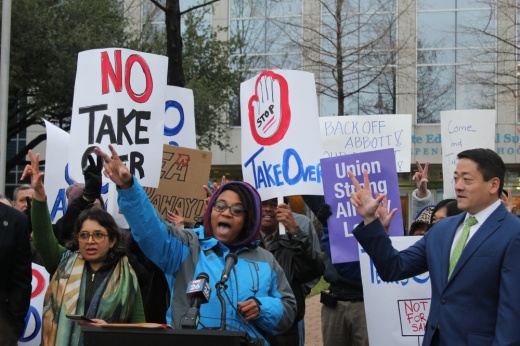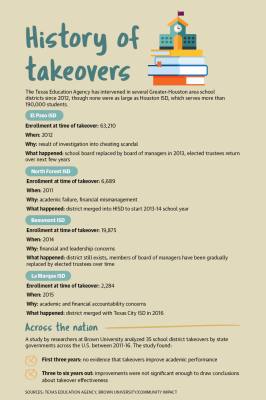The court issued an opinion Jan. 13 in a case related to whether Texas Education Agency Commissioner Mike Morath has the authority to appoint a board of managers for HISD under the Texas Education Code. Writing for the court, Justice Jane Bland vacated an injunction that previously was blocking a state takeover, sending the case back to the trial court to be reheard.
Some public education watchdogs said the court’s decision returns power to the TEA as intended by state law.
“This Supreme Court ruling is a much needed step to ... return the case to the intent of the Legislature back to having a conservator take additional steps to help improve public education in school districts,” state Sen. Paul Bettencourt, R-Houston, said in a statement.
However, public education advocates in the Houston area are calling on lawmakers to speak out against a potential takeover, which they said would remove voting power from local residents and ultimately hurt students and teachers in a district that is still trying to recover from learning loss caused by the coronavirus pandemic.
“My school and district are not perfect, but this is not the solution,” said Elizabeth Rodriguez, a senior at Northside High School, during a Feb. 2 event protesting the takeover.
At a March 3 news conference, a number of Houston leaders, including Mayor Sylvester Turner, spoke out against a takeover. State Rep. Jarvis Johnson, D-Houston, among the speakers at the event, said lawmakers were in the process of rewriting legislation to try to thwart a potential takeover effort.
Other lawmakers present at the event included state representatives Shawn Theirry, Jolanda Jones, John Rosenthal, Ron Reynolds, Gene Wu and Ann Johnson.
The threat of a takeover has left HISD students and parents with a lack of stability, Turner said.
"When you take on the children, you take on their parents, you take on their neighbors and you take on the city," he said at the March 3 event. "Leave HISD alone."
Meanwhile, Houston ISD officials said their legal team is reviewing the case and its next options. The TEA has not indicated what next steps it might take, if any, noting the Supreme Court opinion has not been formalized. The TEA did not respond for requests for comment for this story.
A look back
The TEA notified HISD in November 2019 that it planned to lower the district’s accreditation status and appoint a board of managers in a report that argued the elected school board demonstrated the inability to appropriately govern.
The report alleged several board members violated a state open meetings law by having conversations about an ongoing superintendent search without notifying the public.
A trial court judge granted HISD an injunction in January 2020, temporarily stopping the takeover. That injunction was upheld by an appellate court in February 2021, at which time the TEA appealed the decision to the Texas Supreme Court.
A crucial development in the case took place during the 2021 Texas legislative session with the passing of Senate Bill 1365. Authored by Bettencourt, the bill amended the laws dictating when the TEA has the authority to take over a school district and appoint its own board of managers.
HISD’s Wheatley High School received unacceptable performance ratings seven times between the 2010-11 and 2018-19 school year. It did not receive a rating for the 2011-12 school year after the state adopted a new accountability system and for the 2017-18 school year, during which campuses directly affected by Hurricane Harvey were not given ratings. The A-F system takes student achievement, school progress and closing achievement gaps into consideration.
When SB 1365 was signed into law, it clarified that the TEA could appoint a board of managers when a campus has unacceptable ratings for five consecutive school years, and that a year where no performance rating is given is not considered a break in the consecutive streak. SB 1365 also granted the TEA more power in defining the role of a campus-level conservator, one of whom was previously appointed to oversee HISD’s Kashmere High School.
In October, TEA lawyers argued to the Texas Supreme Court that SB 1365 gave them authority to move forward with the takeover, an argument that prevailed in getting the case sent back to trial court.
Bettencourt said his intention with SB 1365 was to restore the A-F rating system. He said he thought it set a bad precedent to allow HISD to avoid intervention based on the argument that improvements were made as the court case played out, which he said effectively was rewarding bad behavior.
"HISD ran off to say preemptively, 'you can’t do this,' then in the rearview mirror says, 'we fixed everything," Bettencourt said. "I have a problem with that."
He said there were other issues at HISD that concerned him—including declining enrollment, projected budget deficits and a corruption probe in 2021 that saw indictments made against several former HISD officials. Bettencourt said he was not advocating for or against a TEA takeover, but would support the TEA in its ultimate decision on how to proceed.
“Three years ago, I think it was obvious to everybody what needed to happen,” he said. “Three years later, it might be less obvious, but the question remains: what’s the best for the district and its students?”
Making improvements
Following the Supreme Court’s decision, HISD Superintendent Millard House II spoke on what he said were improvements in academic performance since the case first began.
"As Superintendent for the last 18 months, my team has been laser-focused on giving each one of our students the academic experience they deserve," House said in a statement. "Guided by community input, the district developed and is executing on its five-year strategic plan. There is still much more work to be done, but we are excited about the progress we have made as a district and are looking forward to the work ahead."
The TEA suspended the use of its A-F school rating system for the 2019-20 school year because of the coronavirus pandemic, which saw school district’s across the state shift to a virtual learning model.
However, ratings were brought back in the 2021-22 school year, and HISD received an overall rating of 88 out of 100. More importantly, Wheatley High School received a passing rating of 78 out of 100, breaking the streak of failing grades.
Joseph Williams, who served as principal at Wheatley from 2019 to 2022, is quick to point out that improvements were made through a collaborative effort, one that involved school staff and students as well as district administrators, alumni and community members in the Fifth Ward who care deeply about the historic school.
“I just commend my scholars and staff for being resilient and taking on that adversity and staying the course,” Williams said.
Williams assumed the role of Wheatley's principal mid-year in 2019 with a focus on five key areas—vision, culture, instruction, wraparound services and motivation. With support from HISD's central office, Williams said he boosted the presence of tutors in the classroom, built more professional development opporunities for teachers, restructured the layout of the school and helped carry on the Wheatley Alliance Network, a network of alumni and community organizations that dedicate time and resources to students beyond academics.
Under the leadership of current Principal Sabrina Cuby-King, named principal in 2022, Williams said he was confident Wheatley would continue to improve.
"I know that she's going to build upon what we put in place," he said. "Where we were a C, pretty close to a B rating, I know that her goal is to get Phyllis Wheatley to an A."
The day of the Supreme Court decision, Traci Latson, a 26-year teacher with HISD, said she fielded calls throughout the day from her concerned colleagues. In addition to questions about what it could mean for their students, teachers also asked if they should think about applying for jobs at other districts, she said.
“HISD worked so hard last year to become one of the most competitive districts in the region; we still started the school year with over 800 [teacher] vacancies,” Latson said. “The TEA takeover will destabilize and hinder HISD’s ability to maintain and employ highly certified teachers.”
Latson was one of several speakers at a Feb. 2 rally against the TEA takeover hosted outside HISD’s administrative building by the public education advocacy group Community Voices for Public Education. Rodriguez also spoke at the event, expressing concern that a TEA takeover would mean an even greater emphasis on standardized testing.
“We are not just test scores; we are students who need to be heard,” Rodriguez said. “Instead of the takeover, teachers should be paid more adequately so they don’t have to struggle to make ends meet when teaching future generations.”
Research released in May 2021 by Brown University analyzed 35 district takeovers across the U.S. between 2011-16. Researchers said they found no evidence takeovers improve academic performance in the first three years, and improvements from three to six years out were too small to draw any specific conclusions about whether the takeover was effective.
Speakers at the two rallies opposing the takeover pointed out that past school board takeover efforts in the Houston area have targeted school districts that served Black and Hispanic communities. The nationwide study conducted by Brown also found that students of color were overrepresented in the context of state takeovers.
District 145 state Rep. Christina Morales—a Democrat who represents parts of Houston’s Greater Heights and Northside communities—said a state takeover represents a loss of local control for HISD voters.
“How does the commissioner know what our kids need here in Houston?” she said. “State control removes our ability to have a voice in our schools, and state takeovers do not improve academic assessments.”






